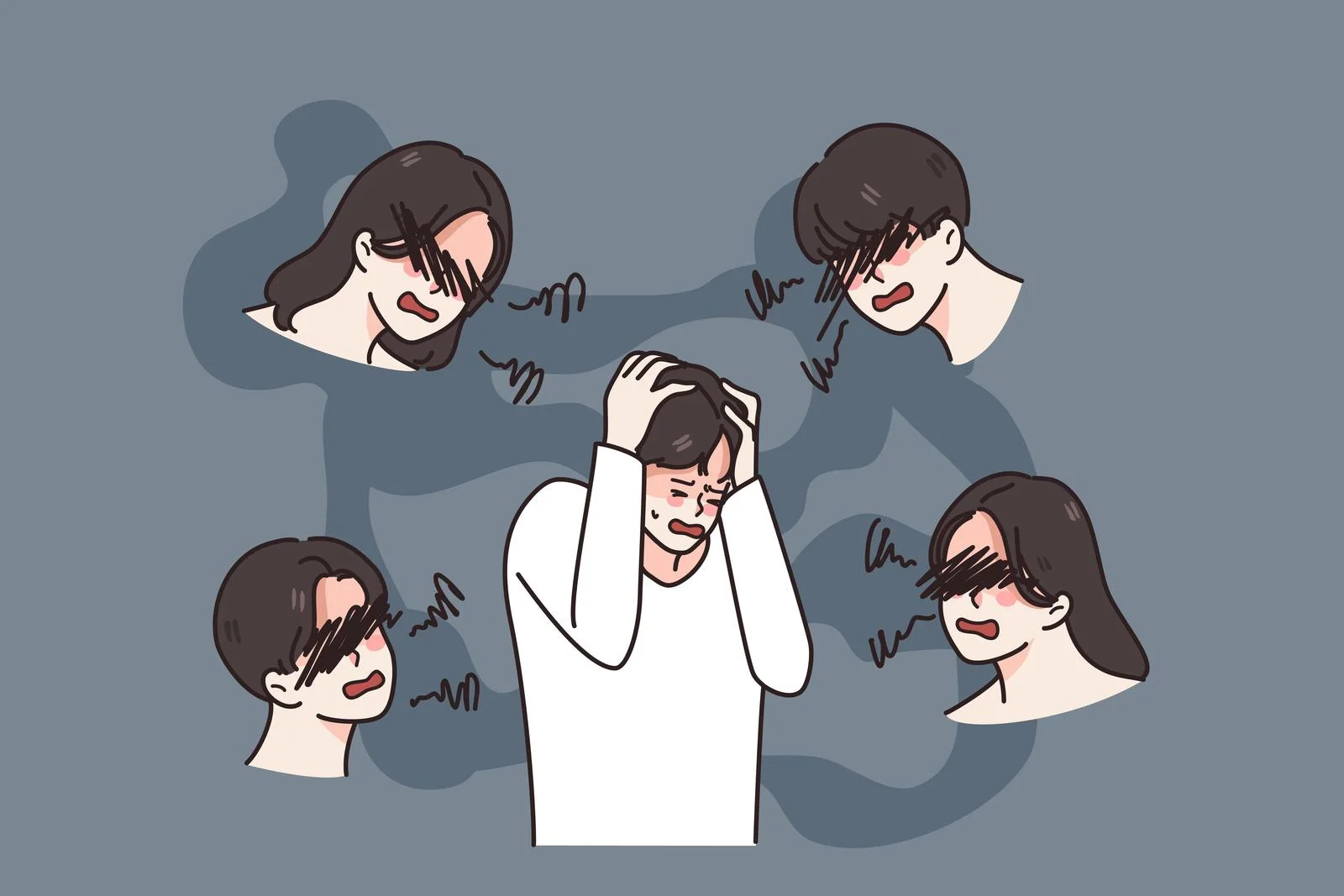This article will review whether OCD-induced psychosis is real, and if so, when OCD becomes psychosis. It will differentiate between OCD and psychosis, clarify the terminology, address misconceptions, and provide insight into these similar mental health conditions.

Can OCD Cause Psychosis?
Recent studies have found a slight indication that the most severe OCD can lead to psychosis in the form of hallucinations, a symptom of OCD. However, this is a common misconception because of how similar OCD and psychosis actually are.
Studies have found that there is a significant overlap between the two disorders. Individuals struggling with OCD experience changes to their emotional control, mental processes, thoughts, and beliefs, but this makes them susceptible to hallucinations.
Other research has found that psychotic symptoms like hallucinations are more likely to occur in people with OCD compared to the general population.
Symptoms of OCD and Psychosis
OCD
OCD stands for obsessive-compulsive disorder. With this disorder, individuals struggle with either obsessions, compulsions, or both. Obsessions are unreasonable thoughts, and compulsions are compulsive behaviors.
OCD usually manifests in childhood, but it can also manifest in early adulthood. It affects men and women to equal degrees and usually runs in families. Symptoms can change throughout your lifetime, and they can ebb and flow depending on what else is happening in your life. Increased stress or anxiety can exacerbate symptoms of OCD.
Psychosis
Psychosis is a mental health disorder where individuals experience delusions, hallucinations, or agitation. Some individuals with psychosis might start speaking incoherently.
Causes of OCD and Psychosis
OCD
There are several factors that can influence the development of OCD.
- Brain abnormalities
- Genetics
- Environment
Research indicates that specific mental health conditions can occur with OCD, such as:
- Anxiety problems
- Depression
- Substance abuse
Psychosis
Psychosis can be caused by:
- Medications
- Schizophrenia
- OCD
OCD and Psychosis Overlap
There are areas where OCD can lead to psychosis. OCD diagnoses are subdivided based on individual cognitive function into three categories:
- The lowest level of cognitive function is when someone with OCD struggles with things like intrusive thoughts, but they know that intrusive thoughts are not likely to be true, so they have good cognizance of what’s real and what’s not.
- The middle level is when that same person experiences poor insight, so their intrusive thoughts might be believed part of the time but not all the time.
- The highest level is when those intrusive thoughts are believed to be true all of the time. At this stage, an individual is struggling with delusional beliefs, and they might even struggle with hallucinations.
Once an individual with OCD reaches the highest category for poor cognitive function, they start to experience severe delusions, hallucinations, paranoia, and disorganized speech.
When OCD Becomes Psychosis
Is OCD-induced psychosis real? How do I know if I have psychosis or OCD? Can OCD lead to psychosis?
It is possible that OCD can result in hallucinations, one aspect of psychosis in individuals who have incredibly high anxiety and severe OCD symptoms. Individuals who reach the highest level of OCD insight, as defined by the DSM-5, are more likely to struggle with psychosis symptoms because they no longer understand the difference between reality and fantasy.
If you are worried about OCD-induced psychosis, the best thing you can do is reach out to a mental health professional for a proper evaluation. They can help you determine whether you have psychosis or OCD and provide personalized treatment plans.
Treatment Approaches for Psychosis or OCD
Treatment for either psychosis or OCD should involve a customized assessment and a personalized treatment plan that involves medication, therapy, and other holistic care.
OCD
Treatment for OCD can involve talk therapy, medication, or a combination of the two. For most people, cognitive behavioral therapy is the most successful form of treatment.
Therapy
- Cognitive behavioral therapy
- Exposure and Response Prevention
- Psychoeducation
- Support Groups
- Rational Emotive Behavior Therapy
- Family Therapy
Medication
- SSRIs
- Antidepressants
- anxiolytic
Psychosis
Treatment for psychosis can involve medication and talk therapy as well as supportive care like hospitalization for extreme cases. While most people receive antipsychotics, they can also receive antidepressants which work well for people undergoing treatment for co-occurring OCD.
Therapy
- Cognitive behavioral therapy
- Psychoeducation
- Family Therapy
Medication
- Antipsychotics

Reducing the Risk of OCD-Causing Psychosis
There are certain things you can do at home, many of which complement the skills acquired in therapy.
As mentioned, OCD is more likely to result in psychosis when individuals are experiencing extreme stress or anxiety because stress and anxiety contribute to heightened symptoms.
For example, an individual who is already struggling with chronic stress, is preparing for a move to a new state, and is having car trouble is enduring a lot of anxiety. This can make their OCD symptoms worse, almost to where they are unmanageable. If that same individual suddenly gets let go from their job, they are more likely to experience a spike in OCD symptoms because of that final stressor and find their symptoms completely unmanageable.
To help reduce your risk of OCD-causing psychosis, you can use at-home strategies to manage your OCD symptoms and alleviate stress and anxiety.
Meditation
Meditation and mindfulness are some of the best ways to reduce your anxiety, alleviate stress, and manage acute spikes in symptoms.
Sleep
Studies confirm that good sleep can reduce the risk of OCD and psychosis symptoms. Keeping good sleep hygiene, going to bed at the same time, keeping your room dark and cool, and turning off devices at least 1 hour before bed can all reduce your risk of psychosis or OCD occurring at the same time.
Exercise
Research has found that regular exercise significantly reduces the symptoms of OCD, but even light exercise can help with psychosis.
Summing Up
With severe cases, you can experience a significant overlap between OCD and psychosis. When OCD becomes psychosis, and you start to experience hallucinations, it’s essential that you reach out for help.
Differentiating between psychosis and OCD takes a clinical diagnosis from a mental health professional. After receiving a personalized diagnosis, customized treatment plans can be provided to give you medication or therapy, maybe even both.
